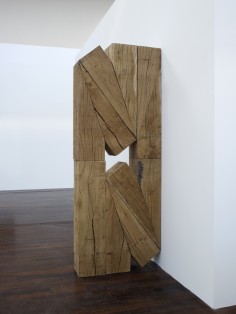Raphaël Zarka
source: artistikrezo
Raphaël ZARKA (né en 1977 à Montpellier, vit et travaille à Paris) est représenté par la galerie Michel Rein, Paris // Diplômé de l’Ecole nationale supérieure des beaux-arts de Paris, ce plasticien français est à la fois photographe, sculpteur, vidéaste … et auteur de livres sur le skate-board qu’il pratique avec passion. Ancien pensionnaire de la Villa Médicis, il pratique un art « ouvert » qui renvoie à la science, l’industrie, la philosophie l’écologie, la politique… Un art qui sollicite l’intelligence et force l’imagination. En quête perpétuelle de nouvelles trajectoires, l’artiste collectionne les formes à la manière d’un archéologue. Des formes abstraites, pensées, construites qu’il ne cesse de recenser ou de réinterpréter. Il a reçu le prix de la Fondation Ricard en 2008.
.
.
.
.
.
.
.
source: bischoffweiss
Raphaël Zarka collects sculptural forms. His ongoing series, Les Formes du Repos (Resting forms), begun in 2001, consists of photographs of remnants of human enterprise littering the landscape: a stretch of unfinished monorail, a concrete breakwater, a lone pylon. Zarka captures the sculptural possibilities of these forms as images, such that the abandoned, the disused, and the forgotten become sites of potential, with a lexicon of formal associations that runs from Plato to modernism to postminimalist sculpture. Moving beyond the strategies associated with archives and appropriation, which have come to characterize contemporary art production in recent years, Zarka’s project reinvests cultural remnants of the past with both functional and aesthetic promise.
Zarka sees himself as an essayist as well as an artist and collector. Robert Smithson is one of his heroes, less for the formal manifestations of his work than for his writing and his mining of an eclectic range of kinds of cultural production. The critic Hal Foster observed, in his text on “the archival impulse,” that the retrieval of preexisting visual sources, be they photographic, filmic, or text-based, is carried out by artists “in a gesture of alternative knowledge.” This observation is echoed to a certain extent in a statement by Zarka: “I never try to present reality as it is. On the contrary, I’m stressing the fact that we can only ever see the world from our own particular cultural viewpoint.”
In his visual ecology of reinvestment and reuse, Zarka not only creates a space of physical and temporal layering with assured elegance, but he propels us into dimensions of discovery and, for those of us used to considering our art from a position of polite critical scrutiny, some vicarious thrill-seeking. Old terrain, seemingly left for dead, suddenly becomes new again.
.
.
.
.
.
.
.
source: michelreincom
Born in Montpellier (France) in 1977.
He lives and works in Paris.
Raphaël Zarka is one of a new generation of artists for whom existing cultural forms constitute the raw material for their work. The point of departure for his art, which encompasses photography, video and the written essay, is fundamentally sculptural in the expanded field of a twenty-first century artist. For many years a skateboarder and the author of several books on its history, Zarka’s idea of skateboarding, as a kind of re-writing of spaces destined for a particular use, rhymes with his approach to his artistic practice. Similar to the abandoned structures built for past moments of aspiration and endeavor, and the recurrence of forms put to new uses, Zarka’s reflections on skateboarding signal ecology of art making of critical and contemporary relevance. For him it’s not a question of an absolute reality but rather, what it is, has been or might be depending on the position from which you view it.


